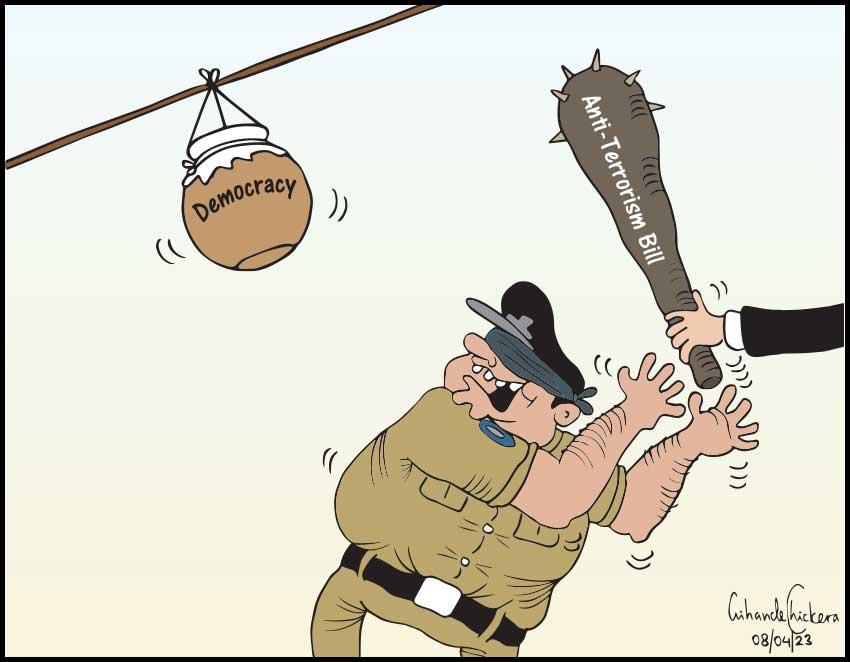Sri Lanka’s proposed Anti-Terrorism Bill, which was recently revised, has come under scrutiny from the Human Rights Commission of Sri Lanka (HRCSL), raising concerns over its potential infringement on fundamental rights.
The commission has submitted observations and recommendations to Minister of Justice Dr. Wijeyadasa Rajapakshe, calling for further revisions to ensure compatibility with Sri Lanka’s Constitution and international human rights obligations.
The key points of concern revolve around the definition of ‘terrorism’ in the bill. Clause 3(1) outlines intentions that can transform ordinary offences into ‘terrorism’. These include intimidating the public, compelling the Government to act or abstain from action, and propagating war.
The commission raises a red flag over the vague nature of some of these intentions, especially the one related to compelling the Government, which could potentially encompass public protests, demonstrations, strikes, and civil disobedience.
“We note that intention ‘(b),’ i.e. ‘wrongfully or unlawfully compelling the Government of Sri Lanka… to do or abstain from doing any act’ may include public protests and demonstrations, strike action, and acts of civil disobedience, which are integral to the fundamental rights of all citizens to the freedoms of expression, association, and peaceful assembly.”
Another contentious issue arises from Clause 3(2)(e), which categorises acts causing serious damage to public places or infrastructure as ‘terrorism’ when carried out with specific intentions.
While such acts might constitute criminal offences under existing laws, the commission is concerned about labelling them as ‘terrorism’. This designation would subject suspects to a separate legal regime under the proposed bill, potentially allowing for detention without the possibility of bail.
“For example, public protests against a particular Governmental policy may escalate to the point where serious damage to a place of public use may occur. While perpetrators of such damage may be dealt with under ordinary criminal law, the characterisation of such acts as an ‘offence of terrorism’ is unreasonable and disproportionate, particularly given that such suspects would be subjected to a separate procedural regime under the proposed bill. For example, by virtue of being a suspect with respect to the offence of ‘terrorism’ as opposed to under the ordinary criminal law, a suspect would be liable to be detained under a detention order without prospect for bail.”
The broader implications of these concerns are highlighted in Clause 10(1)(a), where the bill criminalises the publication of statements, words, or visible representations that could be seen as encouraging or inducing terrorism. In this context, even encouraging a public protest, which might escalate into acts causing damage to public places, could be deemed a separate offence under the bill.
“The effects of the overbroad definition of the ‘offence of terrorism’ are compounded by other provisions of the bill. For example, under Clause 10(1)(a) of the bill, a person who ‘publishes or causes to be published a statement, or speaks any word or words, or makes signs or visible representations which are likely to be understood by some or all of the members of the public as a direct or indirect encouragement or inducement for them to commit, prepare or instigate the offence of terrorism’ also commits an offence.”
The Human Rights Commission’s recommendations to address these issues include a substantial revision of the ‘terrorism’ definition to narrow its scope, the introduction of judicial oversight for detention orders, ensuring judges have the authority to grant bail, guaranteeing suspects prompt and meaningful access to legal counsel, and refraining from granting Police powers to restrict fundamental rights.
“Our main observation is that the definition of terrorism must be changed. It is too broad in nature and must be limited. We also highlighted the fact that the DIG signature is not adequate and that the minister’s signature must be sought like in the current Prevention of Terrorism Act,” Human Rights Commission of Sri Lanka member Nimal Punchihewa told The Sunday Morning.
Meanwhile, the Ministry of Justice said that it would table the bill in Parliament and await any objections raised with the Supreme Court and its subsequent verdict.
“We will not revise it again at this point. It will be tabled in Parliament and then we will see what happens once it is put before the Supreme Court,” Ministry of Justice Secretary Wasantha Perera told The Sunday Morning.
As Sri Lanka continues to grapple with security challenges, this debate over the Anti-Terrorism Bill’s provisions is likely to shape the country’s legal framework and its impact on citizens’ lives. The bill’s future will depend on how policymakers navigate this delicate balance between security and the protection of fundamental rights.


